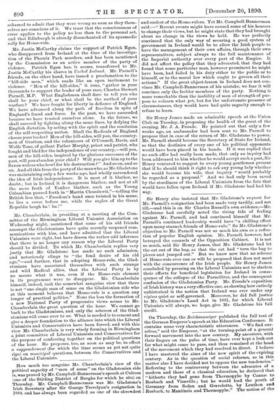Sir Henry also insisted that Mr. Gladstone's request for Mr.
Parnell's resignation had been made very tardily, and not till,—and this is on Sir Charles Russell's own evidence,—Mr. Gladstone had carefully noted the rising tide of feeling against Mr. Parnell, and had convinced himself that Mr.. Parnell's continued leadership would have "a chilling effect upon many staunch friends of Home-rule." So Mr. Gladstone's objection to Mr. Parnell was not so much his own as a reflec- tion of popular English opinion. Mr. Parnell, however, had betrayed the counsels of the Opposition Cabinet. It is not so much, said Sir Henry James, that Mr. Gladstone had let the cat out of the bag, as that the cat had "torn the bag to pieces and jumped out." But we know now that no scheme- of Home-rule ever can or will be proposed that does not meet with the concurrence of the Irish people. Sir Henry James. concluded by pressing on the Liberal Unionists not to slacken their efforts for beneficial legislation for Ireland in conse- quence of the collapse of the Parnellites, and the consequent confusion of the Gladstonian Party. Mr. Froude's exposition of Irish history was a very effective one, as showing how entirely unhistorical is the notion that Ireland was ever under any regime quiet or self-governed. Moreover, he did full justice- to Mr. Gladstone's Land Act in 1881, for which Liberal Unionists will always, we hope, give Mr. Gladstone his full credit.










































 Previous page
Previous page